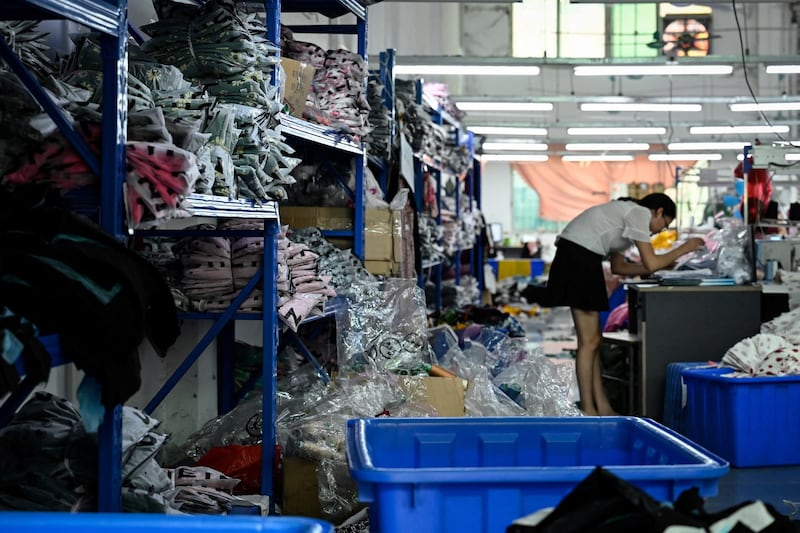Global fashion websites such as Shein may be selling clothes made by Uyghur slaves directly to American consumers by exploiting a loophole in the Uyghur Forced Labor Prevention Act that exempts packages worth less than $800 from inspection, lawmakers were told Tuesday.
The 2021 U.S. law banning imports made using Uyghur slave labor is also being weakened by "transshipments" of goods from China to third-countries that obfuscate their true origin, as well as by a lack of coordination with Canadian and Mexican authorities, according to testimony to the Congressional-Executive Commission on China.
Rep. Chris Smith, a Republican from New Jersey who heads the commission, told the commission that 685 million packages entered the United States last year under the $800 “de minimis” inspection exemption, which he called a “loophole” in the restrictions.
Anasuya Syam, the director of human rights and trade policy at the Human Trafficking Legal Center, an independent group aimed at eradicating human trafficking, said direct-to-consumer sales from low-cost fast-fashion websites like Shein, which usually fall below the $800 threshold, were a “glaring example” of the loophole.
"This 'de minimis' shipping environment is being used to circumvent the UFLPA," Syam said, pointing in particular to a Nov. 20 report from Bloomberg she said showed "companies like Shein were using Xinjiang cotton in their low-value shipments being sent to the United States."
The $800 exemption also created a ready strategy, Syam added, for importers of larger shipments of goods made using slave labor.
“One strategy to circumvent this could also be to break down bigger packages into smaller, under-$800 shipments,” she said. “This is what we are concerned that companies are doing to circumvent the law.”

However, Rep. Jennifer Wexman, a Democrat from Virginia, said Shein's many small direct-to-consumer sales were the main problem, given the large total volume and its alleged ties to Xinjiang cotton.
Shein was founded in China but is now headquartered in Singapore.
“Shein continues to exploit our current ‘de minimis’ policy to sell billions of dollars worth of goods to American consumers,” Wexman said, calling the strategy “so successful that it now holds the largest share of the U.S. fast-fashion market, beating out giants like Zara and H&M.”
Asked about the comments made during the hearing, a spokesperson for Shein told Radio Free Asia in an emailed statement that the company followed the law when it came to supply chains.
“As a global company with customers and operations around the world, SHEIN takes visibility across our supply chain seriously,” the spokesperson said. “For over a decade, we have been providing customers with on-demand and affordable fashion, beauty, and lifestyle products, lawfully and with full respect for the communities we serve.”
Dumped in Canada
Syam also noted concerns that any shipments ultimately rejected at American ports were simply being rerouted to Canada and Mexico, and possibly then re-imported overland into the United States.
Unlike Mexico, Canada also has laws banning imports made with slave labor, Syam explained, but it had been slow to implement them. But she said the issue could only be solved if all three countries cooperate to ensure no North American ports accept slavery-linked imports.
“Canada has detained one shipment which was subsequently released after a successful appeal by the importer,” Syam said. “Mexico, on the other hand, did announce its import ban on Feb. 23 and will begin implementing it in May. So the time is ripe for the three countries to convene the trade ministers to ensure that we are aligned.”
The issue of businesses deliberately shipping goods to third countries for re-import into the United States was also raised.
Kit Conklin, a nonresident senior fellow at the Atlantic Council’s GeoTech Center, said that the “global nature” of supply chains made Customs and Border Patrol’s job difficult because it took a lot of investigation to determine all the origins of a good’s components, especially when an importer had no clear ties to China.
But he said that such work was clearly taking place.
“This gets to a core issue,” Conklin said. “Since UFLPA enforcement began in June of last year, CBP has obtained $490 million worth of goods from Malaysia and over $369 million worth of goods from Vietnam – to provide a bit of perspective here, CBP only detained at $9 million worth of goods imported directly from China.”
Even then, enforcement can become a game of whack-a-mole.
Laura Murphy, a professor of human rights and contemporary slavery at Sheffield Hallam University in the United Kingdom, said some Chinese companies were getting creative by splitting their business operations in half – one for U.S. exports and one for elsewhere.
“They bifurcate their supply chains so they can continue to sell goods in the U.S. market while selling Uyghur forced-labor tainted goods elsewhere in the world,” Murphy said. “Some of those companies are even benefiting from Inflation Reduction Act incentives while continuing to operate or source in the Uyghur region.”
China investigative mission
Smith, the chairman of the commission, ended the hearing by making an unlikely request to Chinese President Xi Jinping: Let him lead a congressional delegation to the Xinjiang region for “a full-scale trip.”
A Chinese foreign ministry spokesperson had said Beijing welcomed foreigners to visit Xinjiang to “see with their own eyes” that no Uyghur forced labor was taking place, he explained, so he had written a letter to Xi to request visas for “a week or 10 days” to carry out a trip.
“So stay tuned,” Smith said. “I hope that we would have unfettered access to the camps and to talk to officials there and, above all, to talk to individual Uyghurs without any fear of retaliation.”
